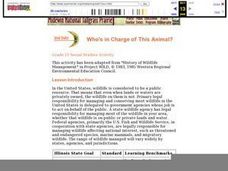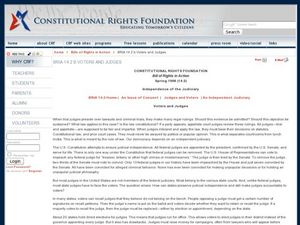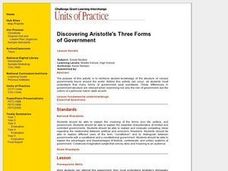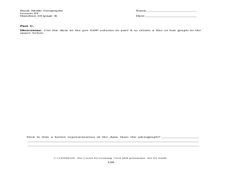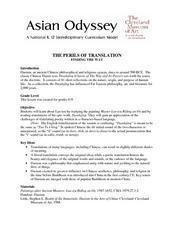Curated OER
The Expanding United States
Students display comprehension of the concept of nationalism. They design a tool to conduct a survey. Students conduct a survey to find out which groups students feel affiliated (family, nation, religion, school, etc). They complie...
Curated OER
Who's in Charge of This Animal?
Eleventh graders study wildlife management and identify the appropriate government agencies that are in charge. They examine different wildlife management techniques. They write a letter showing interest in the activities of one of the...
Curated OER
Voters and Judges
Students analyze the work on independent judiciaries. In this federal courts lesson, students listen to their instructor lecture on details of federal cases. Students respond to discussion questions and participate in an activity...
Curated OER
Lasting Legacies of Ancient Greece
Ancient Greece lesson plans can open up a world of information for students.
Curated OER
Martin Luther King, Jr.
In this online interactive history instructional activity, students respond to 10 short answer and essay questions about the accomplishments of Martin Luther King, Jr. Students may check some of their answers on the interactive...
Curated OER
Max Planck Study Questions
For this online interactive history worksheet, students respond to 10 short answer and essay questions about the accomplishments of Max Plank. Students may check some of their answers on the interactive worksheet.
Curated OER
Francis Firebrace
In this famous person worksheet, students read a passage about Francis Firebrace and then complete a variety of in-class and homework activities to support comprehension, including partner interviews, spelling, cloze, synonym matches,...
Curated OER
Discovering Aristotle's Three Forms
Students, working in small groups, role play different kinds of governments--oligarchy, monarchy, dictatorship, and democratic republic. They portray their form of government in a skit, while other groups guess which kind of government...
Curated OER
What is An American?
Learners consider American values. In this individual responsibility lesson, students discuss democratic ideals that the nation was founded on and participate in an activity that requires them to create "What is an American?" collages...
Curated OER
By Faith Alone - Luther's Legacy
In this Reformation worksheet, students read a 2-page article titled "By Faith Alone-Luther's Legacy," and then respond to a graphic organizer and 5 short answer questions about the Martin Luther and the Reformation.
Curated OER
Population and Population Density
High schoolers read and interpret graphs. For this population lesson, students explore population and population density as they read several data graphs and respond to questions.
Curated OER
The Way You Dream: Gandhi and King's Visions of Nonviolence
Students read Gandhi and Dr. King's messages about nonviolence and discuss their visions about loving one's enemies. In this nonviolence instructional activity, students read Gandhi's "Ahimsa, or the Way of Nonviolence" and Dr. Martin...
Curated OER
The Perils of Translation
Students discover the challenges of translating poetry written in a character-based language through the study of Lao-tzu's work, Daodejing. This lesson includes possible extensions and evaluations.
Curated OER
The Buddha And His Many Different Forms
Students examine the historical Buddha and Buddhism through in-class discussions, visual artifacts, and the practice and performance of the play "The Enlightened One". Evaluation occurs after performance of the play.



